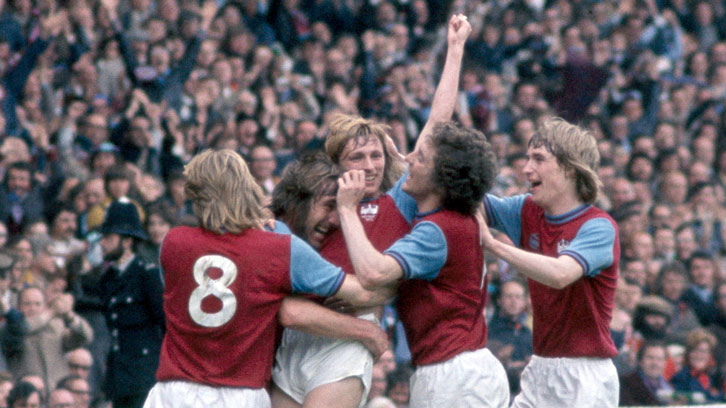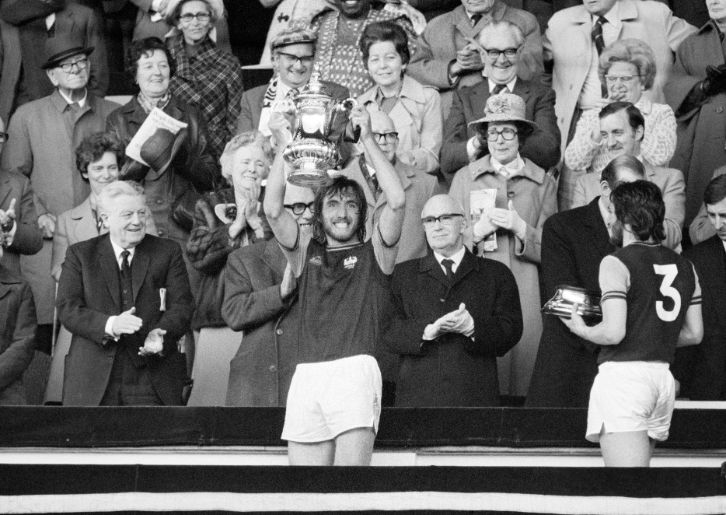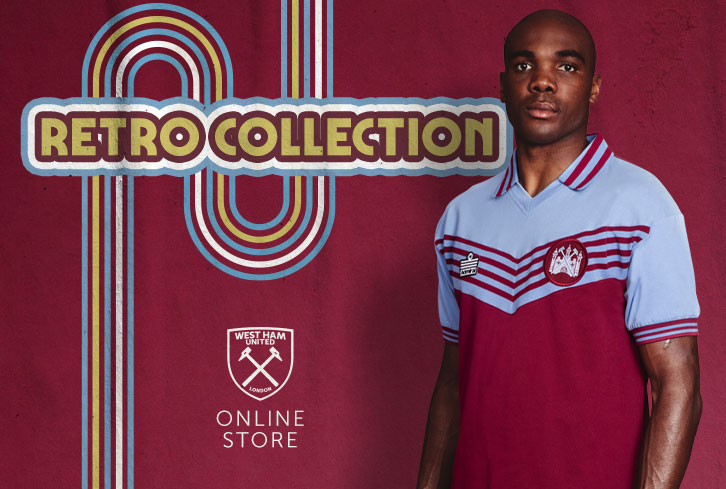West Ham United celebrates its 125th anniversary on 29 June – and as part of our celebrations we're counting down to the date with the Club’s #50GreatestMatches – brought to you by Monster Energy!
Since the Hammers were formed as Thames Ironworks FC in 1895, we have played in excess of 5,500 matches – reaching five FA Cup finals - and one women's FA Cup final, lifting European silverware and competing across the globe and enjoying thousands of memorable moments.
With your help and recommendations, we've whittled down that list of 5,500 matches to a top 50, featuring landmark goals, trophies held aloft, heroic individual performances and remarkable collective efforts.
We continue the #50GreatestMatches countdown by heading down Wembley Way in May 1975...
West Ham United won the FA Cup for the second time in the Club’s 125-year history on a memorable Saturday afternoon in May 1975.
Captained by Billy Bonds, the Hammers secured a 2-0 victory over Fulham at Wembley through two second-half goals from Alan Taylor – the previously unheralded striker plucked from Fourth Division Rochdale the previous winter whose goals had carried the Irons to Wembley.
Taylor had scored two goals each in the quarter-final and semi-final wins over Arsenal and Ipswich Town respectively, while the Hammers had previously defeated Southampton, Swindon Town (after a replay) and Queens Park Rangers on their way to Wembley.
Aside from West Ham’s win, the final was an emotional and historic affair for many reasons, with Second Division Fulham featuring former Hammers and England great Bobby Moore, who had moved to Craven Cottage the previous year. It would be Moore’s final appearance at the stadium where he had lifted the FA Cup himself for West Ham in 1964, the European Cup Winners’ Cup in 1965 and FIFA World Cup Jules Rimet Trophy in 1966.
Played on a traditionally sunny day on Wembley’s traditionally large pitch, the game remained tight and goalless until the 60th minute, when Fulham goalkeeper Peter Mellor parried Billy Jennings' shot into Taylor's path and ‘Sparrow’ pounced to put John Lyall’s side in front.
Four minutes later, Mellor failed to hold on to Graham Paddon’s shot and Taylor was there again to convert West Ham’s second goal.

“I’d only left Rochdale in mid-November so to be playing in that final less than six months later meant that my rise to the top had happened very quickly,” Taylor recalled. “I was still only a young lad and was really, really enjoying my football and, having scored twice in both the quarter and semi-finals, all I could think about was playing at Wembley.
“At half-time, John Lyall told us: ‘Just keep doing what you’re doing’. Although Alan Mullery had seen quite a lot of the ball in midfield, Fulham seemed to have done all that they could do without really hurting us.
“On the hour-mark, their ‘keeper Peter Mellor could only parry Billy Jennings’ shot and I tapped home the rebound. Then, five minutes later, Mellor couldn’t hold a typical Graham Paddon scorcher and I netted my second.
“A bit later, I also had a header that I should’ve done better with and, although I didn’t think too much of it at the time, looking back I get annoyed with myself that I didn’t score because that would’ve obviously been my hat-trick. But you can’t have everything and I’ll still take my two goals all day, any day!”

At full-time, Bonds was among the West Ham players to embrace their friend and former teammate Moore before climbing the famous steps to the Royal Box to lift the famous old trophy, to the delight of the Claret and Blue Army in the stands.
The following day, an open-top bus carried the heroes through the streets of Newham, cheered on by hundreds of thousands of fans, bringing an unforgettable weekend to a fitting end.
